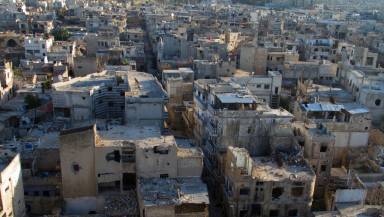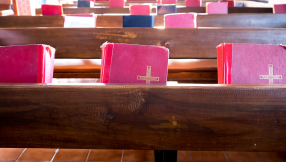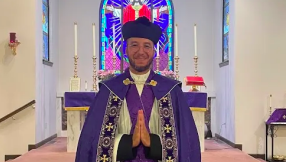
(CP) Christian leaders in Syria meet with the country's new head of government but remain uncertain about its intentions, according to reports, which say no firm commitments emerged from the gathering, leaving the community uneasy about its role in a rapidly changing political landscape.
Church representatives, including Franciscan friars and other clergy, met with Ahmad al-Sharaa – also known by his wartime alias Abu Mohammed Al Jolani, who leads the transitional administration that overthrew the previous regime on Dec. 8, 2024, at the People's Palace in the capital last week, Catholic New Agency reported Saturday.
The attendees included Fr. Ibrahim Faltas, deputy custodian of the Holy Land, and Father Rami Elias, SJ, and they deliberated on matters concerning the Syrian Constitution, democracy and equality.
"It is ambiguous — we cannot discern his true intentions," Fr. Elias was quoted as saying about the outcome of the meeting. "There are no guarantees, and we remain in limbo."
During the conversation, al-Sharaa recalled his time living among Christian communities in Damascus and Daraa, assuring the delegation that their interests would not be sidelined.
However, Elias conveyed an undercurrent of anxiety among the clergy, telling reporters that the outcome was unclear. "Our situation will not be worse than it was before," he said, encouraging Christian leaders to draft their own recommendations for the future Constitution, noting that possible amendments to the 1950 Constitution could gain traction among various groups.
Three patriarchs of the Antiochian See residing in the capital did not attend the session; instead, they sent representatives. Other Christian denominations were present, including Orthodox, Catholic, Armenian Orthodox, Anglican and Syriac Orthodox clergy.
The meeting came amid mounting fear among minorities, who are seeking assurances after the takeover by a coalition led by the Islamist group Hayat Tahrir Al-Sham (HTS).
The civil war, ongoing for nearly 14 years, has fractured Syrian society along religious, ethnic and political lines. Al-Sharaa's administration faces the challenge of restoring calm in areas where vandalism and sectarian attacks have sparked protests.
Hundreds of Christians recently demonstrated after a Christmas tree was set on fire by unknown perpetrators believed to be associated with a jihadist group, La Croix reported.
Thousands of Alawite Syrians also took to the streets following an attack on one of their shrines. A local official from HTS condemned both incidents, but activists questioned whether the new authorities could adequately protect minority groups.
Reports indicate that foreign governments are watching the new administration closely.
According to Axios, U.S. envoy Daniel Rubinstein recently visited the capital and discussed concerns over ongoing violence with Asaad Hassan al-Shibani, the temporary foreign minister.
Citing U.S. officials, Axios wrote that the envoy demanded explanations for multiple videos allegedly showing abuse and killings of minority communities, particularly Alawites. Al-Shibani responded that the new government rejects such acts and attributed them to other armed factions.
The transitional authority also met with Kurdish representatives from the Syrian Democratic Forces (SDF) in an effort to broaden its base. The SDF, backed by Washington, has historically been at odds with Islamist-leaning factions, complicating alliances on the ground.
Al-Sharaa, then known as Jolani, established HTS after severing ties with al-Qaeda in 2016. This rebranding marked a strategic shift as Jolani distanced his group, formerly known as Jabhat al-Nusra, from transnational jihadist goals, according to PBS Frontline. His trajectory as a militant began in Iraq, where he rose through the ranks of the Islamic State of Iraq (ISI) before founding Jabhat al-Nusra in Syria with the support of ISI's successor, IS.
In its early years, Jabhat al-Nusra pledged allegiance to al-Qaeda, aligning with its global jihadist ideology. However, Jolani's decision to cut ties with al-Qaeda was seen as an effort to gain broader legitimacy, according to the Middle East Eye. This transition culminated in the formation of HTS in 2017, incorporating various Syrian opposition groups under a nationalist and ultraconservative Islamist framework.













